The Asian elephant isn’t just a wild animal but a living heartbeat of Malaysia’s forests. As a keystone species, elephants shape the jungle around them - scattering seeds, carving out paths, and sustaining the delicate cycles of countless other plants and animals.
For centuries, these gentle giants have been woven into Malaysia’s history. Once used in warfare and as beasts of burden, they were also revered as symbols of power and prestige - living tributes to strength and honour
But the march of modern life has not been kind to them. As forests shrink under development and logging, elephants lose the space they need to roam. Some fall victims to poachers, others to road accidents, while many more find themselves caught in the struggle of human-wildlife conflict.
Today, fewer than 1,500 wild elephants remain in Peninsular Malaysia. Each loss is not just the passing of an animal - it is a blow to the survival of the species, nudging it closer to extinction.
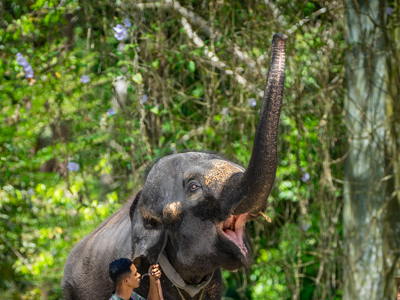
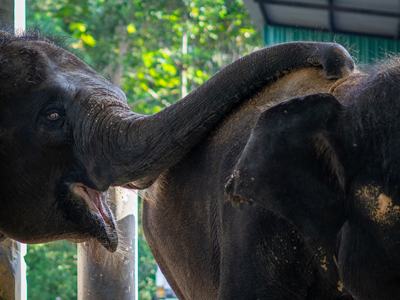
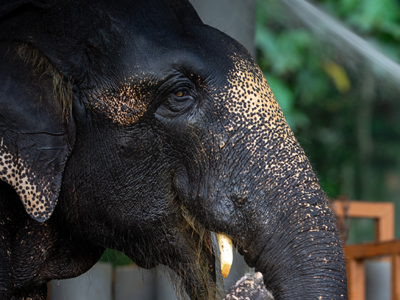
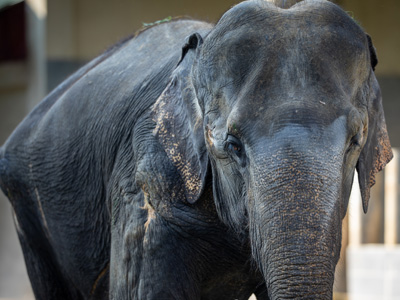
Recognising this, Tenaga Nasional Berhad (TNB) has stepped forward. Guided by its Environmental, Social and Governance (ESG) goals, the company supports conservation efforts that safeguard Malaysia’s elephants while contributing to the country’s broader green ambitions.
TNB's efforts across its operational areas are aligned with the Biodiversity Framework, particularly its goal to conserve endangered fauna. These collaborative conservation activities also reinforce Malaysia’s commitment to SDG 15: Life on Land and adhere to the National Policy on Biological Diversity, which emphasizes the protection of threatened species and the sustainable management of natural ecosystems. Collectively, they demonstrate TNB’s commitment to minimising its impact on biodiversity and actively contributing to the preservation of environmental ecosystems.
Engaging Employees in Wildlife Conservation
In conjunction with World Environment Day 2025, and with support from the Department of Wildlife and National Parks (PERHILITAN), TNB’s Grid Division, together with Pahang’s Department of Environment (DOE), launched the Melestari Hidupan Liar (Preserving Wildlife) programme. The initiative brought employees face-to-face with Malaysia's largest land mammal at the National Elephant Conservation Centre (NECC) in Kuala Gandah, Pahang — just a 90-minute drive from Kuala Lumpur.
Founded by PERHILITAN in 1989, the centre, also known as the Kuala Gandah Elephant Sanctuary, is the only one of its kind in Malaysia. It plays a crucial role in rescuing and relocating elephants displaced by human activity and houses the legendary Elephant Relocation Team, active since 1974, whose work has been instrumental in easing human– elephant conflicts. Today, about two dozen elephants call the centre home, where it functions both as a place of rehabilitation and as an education hub for the public.
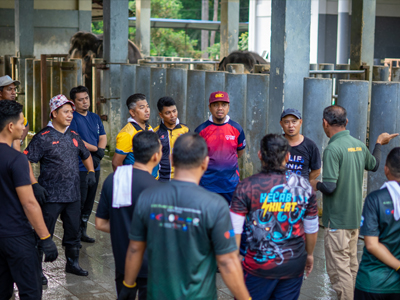

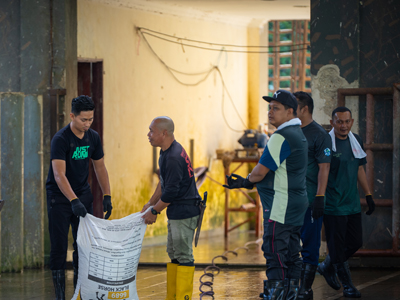
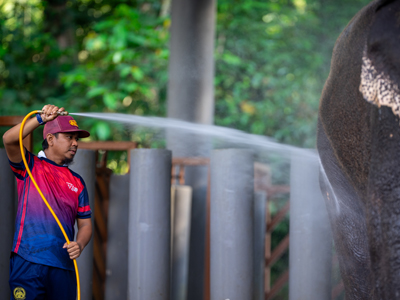
For TNB employees, the visit was more than a field trip - it became a shared experience that fostered reflection, dialogue, and a sense of purpose. Stepping away from the routines of office and fieldwork, employees had the rare opportunity to reconnect with nature in a setting that was both humbling and inspiring. Many described it as an eye-opening encounter that deepened their appreciation of Malaysia’s biodiversity and strengthened bonds among colleagues.
The hands-on awareness sessions proved invaluable. Employees learned about elephant behaviour and the crucial dos and don'ts when encountering wild herds. For TNB Grid East Team, who often work in areas like Gua Musang in Kelantan, Rompin in Pahang, Kenyir, and Kuala Berang in Terengganu, such encounters are not rare. About 100 employees participated in the training, gaining confidence to respond calmly and safely, protecting both people and elephants while supporting efforts to reduce human–wildlife conflict. Building on this momentum, additional training sessions are planned in the coming months to reach an even wider group of employees.
Through its support of the NECC, TNB also empowers local communities. Members of the Orang Asli are employed as mahouts, caring for the sanctuary’s 23 elephants, aged between four and 22. Their work ensures that conservation benefits not only the animals but also the livelihoods of people who live closest to them. TNB further contributed essential tools, including wheelbarrows, shovels, and elephant feed sets, strengthening habitat management and enhancing care for the elephants — supporting ecological resilience and the mitigation of biodiversity loss.
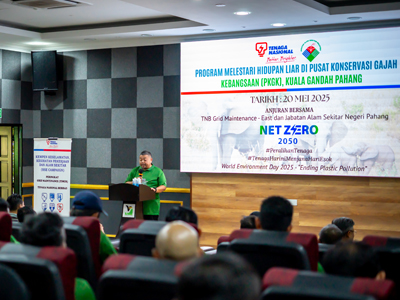
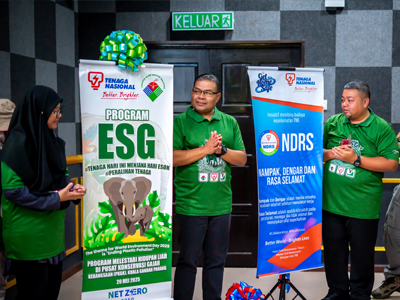
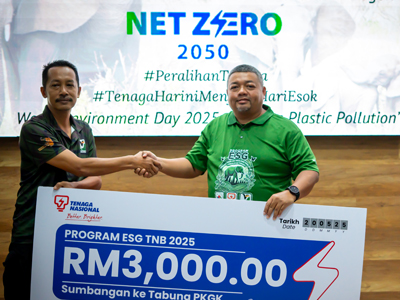
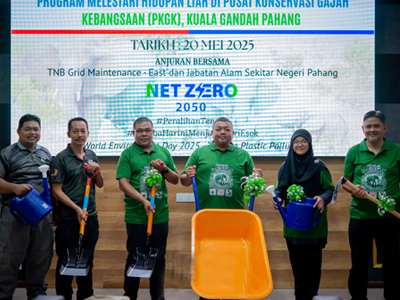
Integrating Elephant Conservation into Infrastructure Planning
Just as the NECC safeguards elephant habitats, TNB is committed to ensuring that its operations coexist harmoniously with nature. In areas where elephant habitats intersect with transmission infrastructure, field teams are trained to maintain a safe distance, carefully observe elephant behaviour, and avoid actions that could startle or block their path. Additionally, TNB receives notifications from PERHILITAN about the movement of wildlife when there is potential danger to employees working on-site, allowing teams to take precautionary measures and adjust operations accordingly. By moving deliberately, communicating clearly, and embedding these practices into daily operations, TNB ensures that reliable energy delivery goes hand in hand with habitat preservation.
To support this approach, Environmental Impact Assessments (EIAs) for planned transmission lines and substations are designed to safeguard ecosystems while explicitly incorporating considerations for critical wildlife habitats, including elephant movement corridors. By mapping routes with biodiversity sensitivity in mind, these assessments help minimise habitat fragmentation and reduce potential human–wildlife conflict. This proactive approach ensures that infrastructure development proceeds responsibly, balancing operational needs with the protection of Malaysia’s unique biodiversity.
Saving Malaysia's Elephants is Everyone's Responsibility
Protecting Malaysia’s elephants is about more than preventing extinction. It is about preserving a living link to our cultural heritage and natural legacy—a responsibility that cannot rest solely on the shoulders of government agencies or conservationists.
With fewer than 1,500 Asian elephants left in Peninsular Malaysia, every life matters. Through the Melestari Hidupan Liar programme, TNB has shown how corporations can move beyond words and take meaningful action for wildlife.
For employees, the experience was transformative. It wasn’t just about learning; it was about connection—standing close to these giants, feeling their presence, and realising that protecting them is also protecting ourselves.
This will not be the last time TNB lends its strength to conservation. The company hopes to continue working alongside PERHILITAN and other partners, helping to safeguard Malaysia’s wildlife and nurture the precious environment that sustains us all
Because saving the elephants is not just about saving a species—it’s about ensuring the story of Malaysia’s giants continues for generations to come.